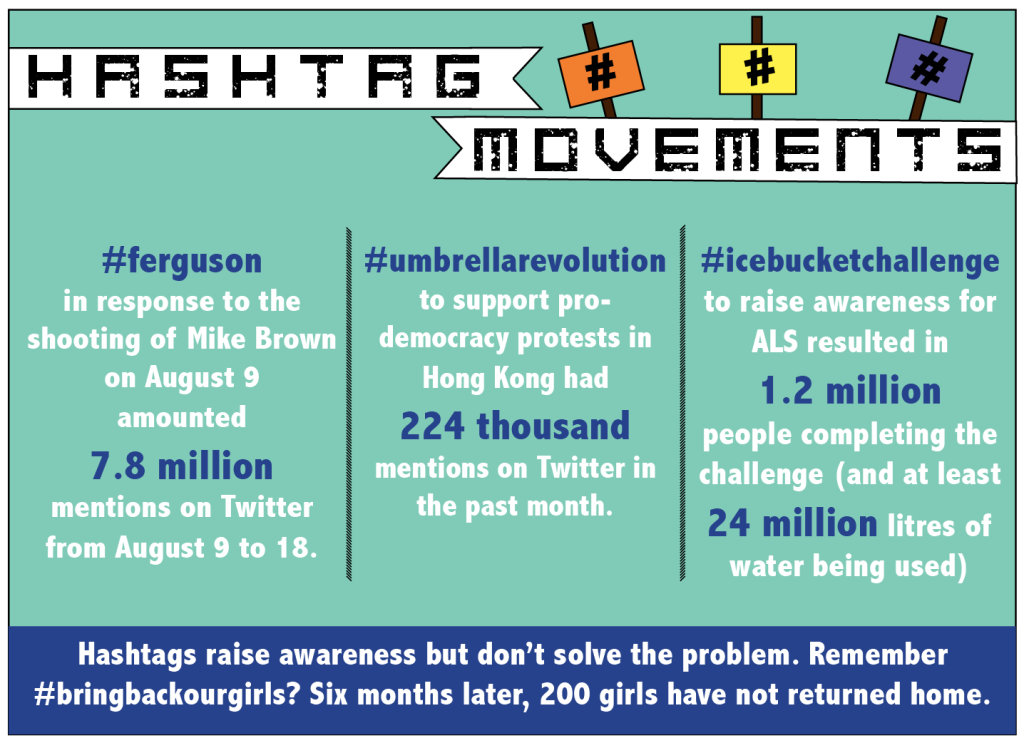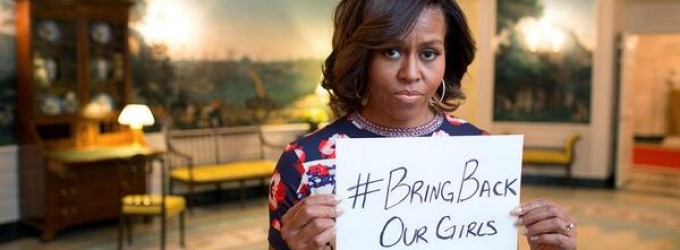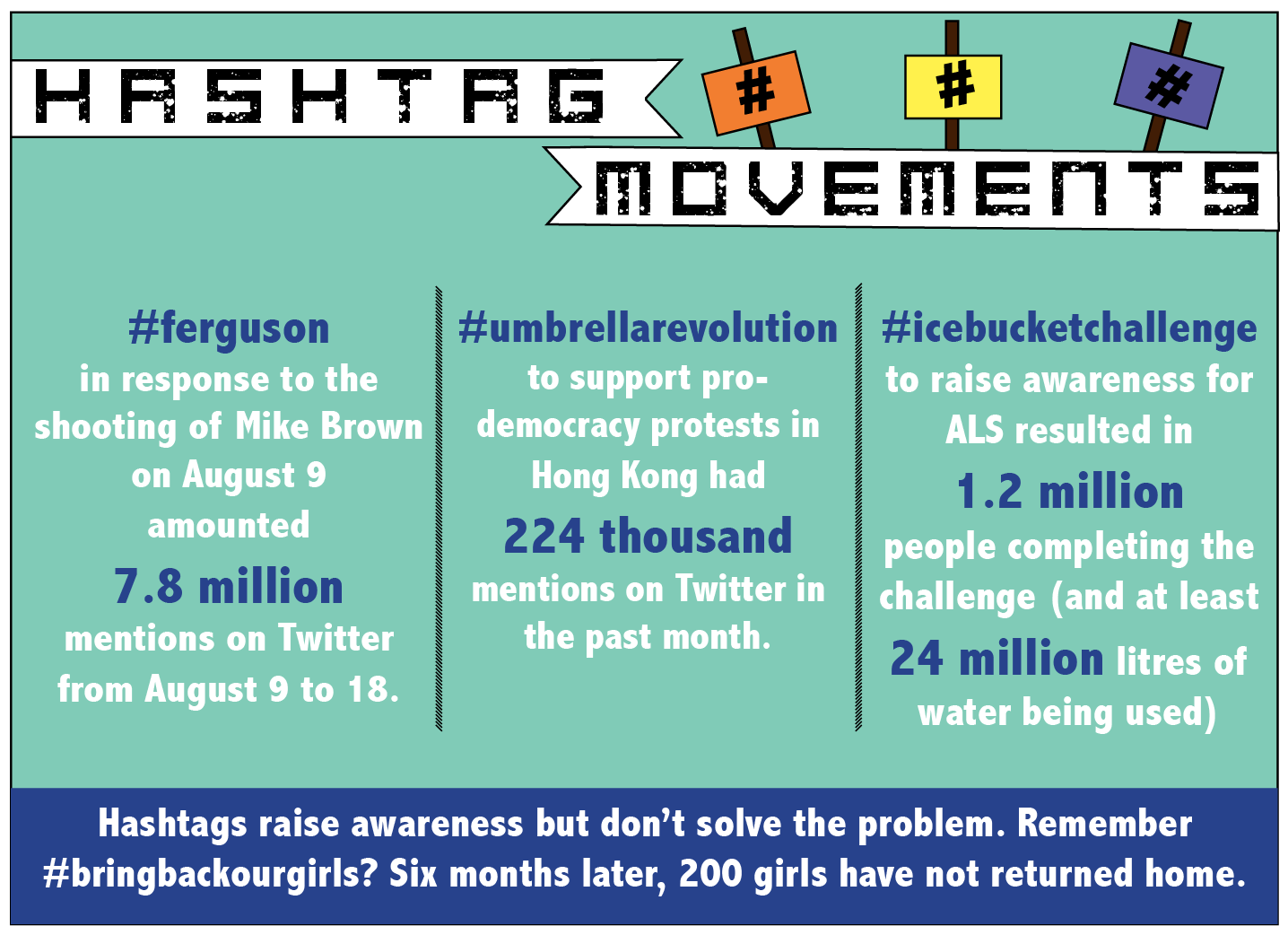
Everyday, 271 million Twitter users send 500 million tweets into the online world, creating a huge collection of public commentary. While most users are interested in celebrities and entertainment, substantial political discourse also takes place on this platform. Twitter has proved successful at reporting the latest news and bringing people together for different causes. And “hashtag campaigns,” in particular, have become popular means for raising awareness of social issues.
Political hashtagging is a powerful tool for diffusing information. Hashtags work as slogans — short, catchy phrases used as a common reference to a particular subject. Supporters of a given political cause are able to group information through hashtags and generate trending topics. In this way, Twitter allows for political actors and the general public to become the narrators of social issues. News reporting is no longer limited to the media, but rather is in the hands of the people.
If it wasn’t apparent before, the power of the hashtag became evident during the tragic events that unfolded in August in Ferguson, Missouri when Michael Brown was shot by a police officer. Social media allowed for an event that may have been dismissed as the shooting of another civilian, to become a topic of national debate. The public, acting as witness to the tragedy and an ally of the victim, reported the development of the events minute by minute. For at least a week, millions of people became interested on the topic and the events unfolding: #Ferguson amassed 7.8 million mentions on Twitter from August 9th to the 18th.
The #Handsupdontshoot campaign was also key in crafting the narrative of the news coverage and provided some of the most powerful images of and commentary on the shooting. The hashtag prompted further collective action, including the rise of a youth civil movement, Hands Up United. The group put together a list of local and public demands to make sure justice would be delivered and to address racial issues in the United States more generally. These discussions centered around #Ferguson and #Handsupdontshoot helped serve as a reminder of how conversations of racial injustice are still relevant and even necessary.
Recently, political hashtag campaigns have grown beyond one social cause to unite several. Protesters in Hong Kong have integrated the #Handsupdontshoot gesture in the recent pro-democracy demonstrations. The “hands up don’t shoot” hashtag created a parallel between the violence surrounding the Ferguson demonstrations and the repressive governmental reactions to the demonstrations in Hong Kong.
Social media has become particularly powerful for the Hong Kong protesters who have taken full advantage of it to spread information in a country with high levels of censorship. Besides appropriating other causes’ hashtags, they have created their own: #Umbrellarevolution. The slogan was born after Hong Kongers started using umbrellas for protection against teargasing. Ironically, policemen’s crowd “control” means have created a powerful hashtag with millions of daily mentions, even making it to the front page of the latest issue of TIME magazine.
If very effective at spreading the word, political hashtag campaigns also have limitations. Last April, #Bringbackourgirls emerged as an online camping to raise awareness of the abduction of nearly 300 girls in northeastern Nigeria by the terrorist group Boko Haram. The hashtag quickly became viral. Famous public figures such as First Lady Michelle Obama and Nobel laureate Malala Yousafzai took pictures with posters displaying the hashtag. The event appeared to be of global concern.

It would be naïve to think, however, that the five million Twitter mentions that #Bringbackourgirls received could solve the problem. Today, many of the girls remain under Boko Haram’s control. A Human Rights Watch report claims that the organization has kidnapped as many as 500 girls since the beginning of last year. Nigerian troops have faced difficulties locating and rescuing the captives in the vast and remote Sambisa Forest, even with the use of drone technology. Boko Haram has in fact, expanded, and even mocked the #Bringbackourgirls campaign in an unsettling video.
After the lack of positive results, the #Bringbackourgirls campaign lost popularity and heavily dropped in mentions on Twitter. Instead, people became interested in the #Icebucketchallenge, a campaign to raise awareness of Amyotrophic lateral sclerosis , ALS. Twitter and Facebook users who were nominated by their friends to do the #Icebucketchallege were asked to shower themselves with a bucket of icy water or donate to the ALS cause. Despite the fundraising success, the campaign has been heavily criticized for promoting water waste. According to the New York Times, 1.2 million people completed the challenge. An average bucket contains up to 10 liters of water, meaning that at least 12,000,000 liters were thrown away — enough to fill five Olympic swimming pools.
While Twitter can be a powerful tool for political activists around the world, it is important to remember that the social media platform is a means, not an end, for political action. Politicians have also explored the pros and cons of hashtagging. During the initial phases of the 2012 US presidential elections, the Obama and Romney campaigns invested more in social media than in television. Obama’s political slogan “forward” soon became a hashtag on Twitter, as thousands of users used it to show their support. Still, hashtags are a double-edged sword, since opponents might very easily use them to criticize the opposition. Both #Obama and #Romney hashtags are linked to numerous images that heavily criticized their political campaigns.
With less than 10 years of existence, Twitter is a recently developed technology. Political actors are still exploring the network’s advantages and limitations. Recent examples, such as the Michael Brown shooting or the Hong Kong demonstrations, show how Twitter hashtagging might empower citizens by giving them a voice. On the other hand, acting in the online world will never replace concrete action in the offline world. As the #Bringbackourgirls campaign shows, if no action is taken offline in response to an online movement, little will be achieved, regardless of how supportive the online global community is.
Expanding political activism on Twitter should not substitute efforts undertaken in the offline world. Twitter is indeed a powerful means for raising awareness, calling for collaborative action and reporting news from the public perspective. Nonetheless, it is important to regard Twitter as a means, not an end, for political action.
